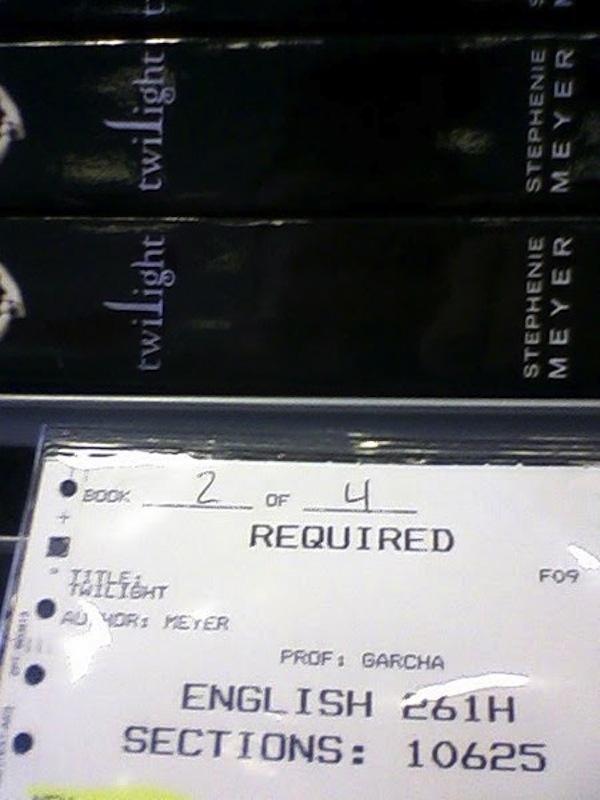Twilight is Required Reading in College
Today, this picture has been circulating around the Internet.

It would be bad enough if Stephenie Meyer's Twilight was required in a high school course, but this is college. I had to know more about this, so I decided to look way too far into the matter.
First, the professor's name according to the picture is Garcha. The most prominent name I found is Amanpal Garcha of Ohio State University. According to his page on Ohio State University's website, he "received his BA in English from Johns Hopkins University and his MA and PhD in English from Columbia University." Yes, you read that right.
This is the man who forces students to read emo bullshit (image from the same site):

I crawled through the university's website and found the syllabus from here. I've mirrored a copy of the Word document. Click here to download it. I'll show the "highlights" below.
I have to start by mentioning something; this syllabus is used as an example for graduate teaching assistants. This is the shining example Ohio State University uses for its "Introduction to Fiction" course? Let's examine this.
While we read and discuss some important, influential narratives about the supernatural – Mary Shelley’s Frankenstein, Bram Stoker’s Dracula, Henry James’ The Turn of the Screw, and Stephenie Meyer’s Twilight as well a few minor works – we will also explore how these texts, like much other fiction, try to create particular reading experiences, as they push us to consider the nature and importance of literary imagination and the way fiction’s seductiveness is tied to other potentially dangerous attractions.
That's one sentence. An English professor wrote that huge run-on sentence. "As" is not a conjunction. Putting my tangential grammar-bitching aside, let's look at the required texts.
- Mary Shelley, Frankenstein (Penguin)
- Bram Stoker, Dracula (Penguin)
- Henry James, Turn of the Screw and Other Stories (Bantam)
- Stephenie Meyer, Twilight (Little, Brown)
I have a number of problems with this. Let me count the ways.
1. Twilight does not deserve to be on an "influential" list.
I thought that this went without saying, but apparently not. Twilight wasn't influential; it's derivative. Before there's any complaining, "derivative" isn't an insult. Most fiction is derivative. It's the way a book is written that determines its success. Vampires vs. werewolf stories are a sub-genre themselves. If anything, Meyer just merged two copies of Romeo & Juliet with the film Underworld (2003). Even if you want to argue that it's influential, it was published at the end of 2005. There hasn't been enough time for it to become influential. A human woman caught between the loves of a vampire and a werewolf hasn't been done again... except that it has.
2. The Human/Vampire/Werewolf Triangle has already been done.
There's a book series by Charlaine Harris. You may have heard of it ever since HBO started making a series based on it. Originally, they were called the Sookie Stackhouse Chronicles, but they are now know as the True Blood series. They've been published since 2001, and they are much, much better. The series starts with Dead Until Dark. Read that instead. Bill Compton trumps Edward Cullen any day.
3. If you're going to use an emo vampire as a literature example, at least use the actual influential work.
The fiction that I know that started the emo vampire craze was Interview with the Vampire by Anne Rice, published in 1976. Although I don't like Anne Rice's work, I can't deny both its influence on the genre as well as its strong themes. Rice's story involves Louis struggling to redeem himself of a past of evil deeds while Lestat keeps trying to pull him back to the dark side. Meyer's story involves Bella crying over her indecision of which species gets to pop her cherry.
As for the rest of the stories, Frankenstein and Dracula are undeniably influential works of fiction. Turn of the Screw is a piece that you'll have never head about if you're not an English major. It's the kind of story that sparks debates and controversy over its interpretation. It's a story to make English majors feel like there's a purpose to their degrees, so it's understandable why it's on the list.
As one last jab at this course I have to point out one of the cardinal sins of literature courses in college: the required texts. If there is a new book that buying it is required, that's somewhat understandable. However, too many professors demand student's to purchase a book from the bookstore when it is legally free. All three other books required for this course are public domain. I've seen professors take points off a student's grade because they didn't actually purchase the book; the student used the free online version in class. I don't know how Ohio State University treats this, but if anyone reading this ever takes Professor Garcha's English H261: Introduction to Fiction class, use these links to Project Gutenberg instead.
Of course, if you have to read Twilight to get your degree, you should drop the course and start some major soul-searching instead.
